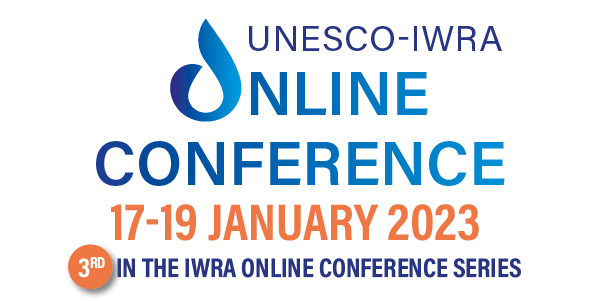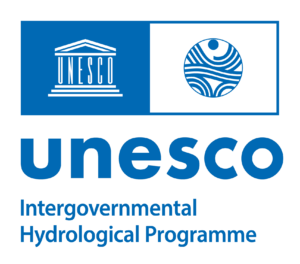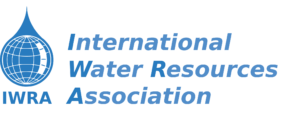
Programme
Access the programme below to learn more about the different sessions, keynote speakers, distinguished speakers, etc. who presented at the UNESCO-IWRA Online Conference on Emerging Pollutants.


Day 1
Tuesday,
January 17th
13:00-14:30
Moderator:
Renée Martin-Nagle
Treasurer, IWRA; CEO, A Ripple Effect pllc; Special Counsel at Eckert Seamans; Visiting Scholar at the Environmental Law Institute
Co-Moderator:
Monica Garcia Quesada
Smart Water Cities Project Officer, IWRA
Welcome messages:
Abou Amani
Director of the Division of Water Sciences and Secretary of the Intergovernmental Hydrological Programme – IHP
Yuanyuan Li
IWRA President; Vice President of the General Institute of Water Resources & Hydropower Planning & Design, Ministry of Water Resources
Sarantuyaa Zandaryaa
and Gabriel Eckstein,
Conference ISC Co-Chairs
Keynote Speaker:
Claudia Olazabal
Head of Unit of Sustainable Freshwater Management, DG ENV, European Commission
Q&A
14:45-16:15
Moderator:
Xinghui Xia
Professor, School of Environment, Beijing Normal University
Co-Moderator:
Gisela Umbuzeiro
Professor, Faculty of Technology at the State University of Campinas (UNICAMP)
Keynote Speaker:
Damia Barcelo Culleres
Professor, Institute of Environmental Assessment and Water Research, Higher Council for Scientific Research
Speakers:
“Emerging pollutants in aquatic ecosystems Mutagenicity evaluation of the rubber tire oxidant byproduct, 6PPD quinone, using the Ames assay”
Gabriely Groto Militão,
State University of Campinas – The School of Technology
“Assessing forever chemicals in South Florida aquatic environments and potential environmental and human health risks“
Natalia Soares Quinete,
Florida International University
“Occurrence of emerging contaminants in Pampulha Lake: anthropic pollution of a UNESCO Heritage Site“
Ramon Domingues,
The State University of Campinas (Unicamp)
“Transport of Veterinary Pharmaceuticals in Lowland Catchments: a Lumped Modelling Approach”
Nikola Rakonjac,
Soil Physics and Land Management Group, Wageningen University, Netherlands,
“Bioremediation of Azo dye Tartrazine Yellow by three different microalgae genera”
Maryssa Fernanda Zecchin Simões,
Programa de Pós-graduação em Recursos Naturais (PPGERN), Federal University of São Carlos (UFSCar), São Carlos, SP, Brazil
“Water contamination in a multi-industrial region in Brazil: Decision support for water quality evaluation and management of contaminants of emerging concern”
Hadassa De Souza Ramos Pontes Moura,
University of Brasilia
Q&A
16:30-18:00
Moderator:
Robert Kalin
Professor, Strathclyde University, Glasgow Scotland
Co-Moderator:
Malcolm Gander
Environmental Manager, United States Department of Defence
Keynote Speaker:
Daniel Lapworth
Principal Hydrogeochemist, British Geological Survey (BGS)
Speakers:
“How to prioritize agrochemical pollutant evaluation in drinking water? RISK21 tools provide a framework for chemical risk assessment”
Eliana Munarriz,
University of Buenos Aires, Faculty of Agronomy, Research Institute in Agricultural and Environmental Biosciences/ CONICET
“Understanding the Prevalence and Occurrence of Antimicrobial Resistance in Urban Karst Groundwater Systems“
Rachel Kaiser,
Tennessee Technological University
“Assessment of emerging organic contaminants at the groundwater of Yucatán peninsula: recreational and water supply”
Rosa Leal-Bautista,
Centro de Investigación Científica de Yucatán
“Emerging contaminants in groundwaters and their relation to recharge sources in Bengaluru City, Karnataka, India”
Bentje Brauns,
British Geological Survey, Environmental Science Centre; Hydrogeologist, Project Manager, Environmental Change Adaptation & Resilience
“An Analysis of the Main Categories of the Contaminants of Emerging Concern (CECs) in Global Groundwater”
Malcolm Gander,
Consultant in Earth Sciences
“Microplastics in urban soil and groundwater in the city of Bauru, São Paulo, Brazil”
Tamiris Ferreira,
Universidade Federal de São Paulo, Departamento de Ciências Ambientais
“Impact of Changing Tourist Numbers on Sunscreens and Antibiotics in Groundwater during The Covid-19 Pandemic Riviera Maya, Mexico”
Melissa E. Lenczewski,
Institute for the Study of the Environment, Sustainability, and Energy; Northern Illinois University
Q&A
Day 2
Wednesday,
January 18th
09:00-10:30
Moderator:
Robert DiFilippo
Lecturer of Hydrogeology, University of the Philippines
Co-Moderator:
Piero Gardinali
Professor, Department of Chemistry & Biochemistry, Florida International University
Keynote Speaker:
Theodore B. Henry
Heriot Watt University,
United Kingdom
Speakers:
“Determination of microplastics in wastewater samples from two wastewater treatment plants in Spain and in a managed aquifer recharge system.”
Albert Contreras Llin
Department of Environmental Chemistry (ENFOCHEM); Institute of Environmental Assessment and Water Research (IDAEA-CSIC)
“Ecological impacts of microplastic pollution in fresh water; a comparative study on urban and rural water supply”
Nivetha E.,
Research Scholar, Department of Civil Engineering Annamalai University
“Bioavailability quantification and uptake mechanisms of pyrene associated with different-sized microplastics to Daphnia magna”
Hui Lin,
Nanchang hangkong University JiangXi Province
“Environmental exposure assessment of product-released engineered nanomaterials (PR-ENMs) from commercial products“
Mbuyiselwa Moloi,
Centre for Environmental Management, University of the Free State
“Interaction of the pesticide fipronil and its biodegradation products with polyethylene microplastics in ultrapure and river water”
Camila L Madeira,
State University of Campinas (UNICAMP)
Q&A
10:45-12:00
Moderator:
Robert Kalin
Professor, Strathclyde University, Glasgow, Scotland
Co-Moderator:
Nikola Rakonjac
Ph.D Candidate, Department of Soil Physics and Land Management, Wageningen University & Research, Netherlands
Speakers:
“Landfill Site selection and bioremediation of emerging contaminants in groundwater.”
Waseem Raja,
Ph.D. Scholar in the Department of Civil Engineering Indian Institute of Technology Jammu
Akil Gupta
Project Officer, Water Quality Lab, Indian Institute of Technology Jammu
“Assessment of harmful Algae as an emerging pollutant of domestic water supply from rainwater harvesting facilities in Sudan “
Sabry Z. Wahba,
Water Pollution Research Dept., Institute of Environmental and Climate Change Research, National Research Center, Cairo
“Soil aquifer treatment application to improve the chemical quality and increase the quantity of groundwater“
Silvia Díaz Cruz,
Spanish Council for Scientific Research (CSIC); Institute of Environmental Assessment and Water Research (IDAEA); Dept. of Environmental Chemistry
“An overview of endocrine-disrupting compounds in drinking water and human health“
Suryakanta Acharya,
PAY-W Clinic, Assam Cancer Care Foundation;Consultant Oncologist, Assam Cancer Care Foundation
“Contamination of groundwater with sulfamethoxazole and trimethoprim and spread of drug resistant Escherichia Coli in formal settlements of Kisumu, Kenya“
Kellen Karimi,
University of Nairobi, Department of Public and Global Health
“Development of a GIS based tool for the prioritisation of sites with the potential to be sources of polyfluoroalkyl and perfluoroalkyl substances (PFAS) impact to the water environment“
Jane Thrasher,
Jacobs, Water & Environment Director; Ground Contamination and Land Quality Global Community of Practice Leader
“Monitored and Intentional Recharge (MIR) – The intensive observation as a key to achieve water quality improvement; A conceptual model to draft water quality regulations about Managed Aquifer recharge (MAR) and water reuse”
Enrique Fernandez Escalante,
Tragsa R&D – IAH MAR Commission
Q&A
12:15-13:30
Moderator:
Cassiana Montagner,
Associate Professor, UNICAMP, Brazil
Co-Moderator:
Monica Garcia Quesada
Smart Water Cities Project Officer, IWRA
Speakers:
“Occurrence and source of typical odor-causing compounds in drinking water of major cities across China“
Chunmiao Wang,
Research Center for Eco-Environmental Sciences, Chinese Academy of Sciences
“Impacts of anthropogenic activities on water quality in the Guiers Lake basin: a spatio-temporal evolution of emerging pollutants“
Hikimat Saadi,
Cheikh Anta Diop University (UCAD); Doctoral School on Water, Quality and Uses of Water (EDEQUE)
“Multi-tracer approach for understanding emerging pollutants sources and behavior in aquatic systems to support national and transboundary water management“
Yuliya Vystavna,
International Atomic Energy Agency
“Exposure assessment of emerging pollutants in the uMhlathuze and uThukela River-Estuary, South Africa”
Lungelo Rejoice Nsibande,
University of Zululand, South Africa
“Identifying the Emerging Pollutants in Aquatic Ecosystems: Turkey Example“
Esra Şıltu,
Advisor to the General Director, Republic of Türkiye Ministry of Agriculture and Forestry/DG State Hydraulic Works
“Quantum Chemical Computations Promote Understanding of Microbial Reductive Dehalogenation“
Shangwei Zhang,
Advanced Interdisciplinary Institute of Environment and Ecology, Beijing Normal University
” Assessment of stakeholders’ demands on aquatic pollutants to support the transfer of research results“
Maïté Fournier,
ACTeon Environment
Q&A
13:45-14:45
Moderator:
Sarantuyaa Zandaryaa
Programme Specialist, Division of Water Sciences, Intergovernmental Hydrological Programme (IHP), UNESCO
Co-Moderator:
Karishma Asoodani,
Financial Multi-platform International journalist and Water Youth Advocate
Speakers:
Omar Elhassan,
Environmental Antimicrobial Resistance and Water Management Expert, FAO, United Nations
Richard Elelman,
World Water Quality Alliance (WWQA), United Nations Environment Programme (UNEP)
Jennifer Molwantwa,
CEO, Water Research Commission of South Africa
Ting Ruan,
Professor, State Key Laboratory of Environmental Chemistry and Eco-toxicology, Research Centre for Eco-Environmental Sciences, Chinese Academy of Sciences
Q&A
15:00-16:30
Moderator:
Marjin Korndewal
Policy Analyst, OECD Environment Directorate, France
Co-Moderator:
Dahlia Sabri,
Deputy Resident Engineer, KEO International Consultants
Keynote Speaker:
Styliani Avraamidou
University of Wisconsin-Madison, USA
Speakers:
“Occurrence of antibiotics and psyquiatric drugs in brazilian municipalities: a data analysis approach“
Júlia Carolina Braz de Freitas Bijos,
Federal University of Bahia (UFBA), Industrial Engineering Department
“Bio-based and circular solutions for Harmful Algal Bloom (HAB) and water and climate change challenges in Berlin-Brandenburg“
Kei Namba,
PostDoc, Technische Universität Berlin
“Management Of Emerging Pollutants with a Circular Economy Approach; Lessons from Developed Countries in This Field, Suggestions for Northern Cyprus“
Farhad Bolouri,
Ph.D. student and Doctoral Research Assistant Faculty of Civil and Environmental Engineering Near East University
“Emerging Issues of Water and its Impact on Health: A Case Study of Jaipur City, Rajasthan, India”
Mehnaj Sheikh,
Research Scholar, IASE University, Sardarshahar, Churu, Raj., India; Associate Professor (Geography) Govt. Lohia College, Churu, Rajasthan, India
“Spatio-Temporal Assessment of Chlorine Residual in the Water Distribution System of Dhaka City”
Mezanur Rahaman,
Masters of Science in Civil and Environmental Engineering
Bangladesh University of Engineering and Technology (BUET)
“Communal construction of water catchment areas to regulate water cost and increase sustainability supply”
Christopher Ndiyo,
Agricultural Science and Entrepreneurship Student
“Production and Life cycle assessment of microbial colorants”
Valéria de Carvalho Santos-Ebinuma,
Department of Biotechnology, Engineering School of Lorena, University of São Paulo
Q&A
16:45-18:00
Moderator:
Mary Trudeau
Project officer – i-WSSM UNESCO Global Water Security Issues project, IWRA; Director, Envirings Inc.
Co-Moderator:
Suryakanta Acharya
Founder, PAY-W Clinic, India
Speakers:
“Evaluation of Sustainable materials to boost Emerging pollutants sorption during Soil Aquifer Treatment for Water Reuse“
Cristina Valhondo,
Institute of Environmental Assessment and Water Research of the Spanish National Research Council (IDAEA-CSIC)
“Reuse of nutrient-rich treated wastewater for food self-sufficiency: Addressing health concerns of emerging contaminants of small-scale farmers through agro-ecological tools – A case study from Fayoum governorate, Egypt“
Ahmed A. Rezk, M.Sc
Project Manager
“Removal of pharmaceutical contaminants from wastewater using ceramic membrane filter“
Edith Nwakaego Okey,
Kwame Nkrumah University of Science and Technology (KNUST), Kumasi
“Data Science applied to the sanitation sector: an investigation in open databases“
Simão Urpia,
Federal University of Bahia (UFBA), Chemical Engineering Department
“High surface area chemically activated carbon derived from bamboo sawdust for the remarkable removal of paracetamol from water. Sorption kinetics, isotherm, thermodynamics and regeneration studies”
Wondimu Kebede Wakejo,
Africa Center of Excellence for Water Management (ACEWM), Addis Ababa University; Chemical Engineering Department, Wachemo University
“Sustainable Development: A Strategic Approach for Sustainable Business Practices in Trade Effluent Generating Industries in Francistown Region in Botswana”
Kene Dick,
UNICAF University
“Niobum-Based Advanced Nanomaterials for Emergent Pollutants Removal from Wastewater”
Lanna Emilli Lucchetti,
Universidade Federal do ABC, Bairro Bangu, Santo André
Q&A
Day 3
Thursday,
January 19th
09:00-10:30
Moderator:
Suryakanta Acharya
Founder, PAY-W Clinic India;Consultant Oncologist, Assam Cancer Care Foundation
Co-Moderator:
Dahlia Sabri
Deputy Resident Engineer, KEO International Consultants
Keynote Speaker:
Gordon McKay,
Hamad Bin Khalifa University in Qatar
Speakers:
“Algal-bacterial consortia, Bioaccumulation, Biodegradation“
Ubhat Ali,
Indian Institute of Technology Jammu
“The removal efficiency of pharmaceutical residues from three wastewater treatment plants in Saudi Arabia and their potential for pollution of groundwater“
Obaid Alharbi,
National Center for Water Technologies, King Abdulaziz City for Science and Technology (KACST)
“Multiple pollutants in rivers from wastewater: synergies and trade-offs in future pollution control“
Maryna Strokal,
Assistant professor Water Systems and Global Change (WSG) Wageningen University & Research
“Removal of emerging pollutants from urban water: Alternation of existing tertiary treatment process by using heterogenous photo-Fenton process“
Yunus Ahmed,
Australian Centre for Water and Environmental Biotechnology, University of Queensland; Dept. of Chemistry, Chittagong University of Engineering & Technology (CUET)
“Occurrence of Emerging contaminants in wastewater and Its Remediation“
Mehak Puri,
Environmental Impact and Sustainability Division, CSIR-National Environmental Engineering Research Institute
“Facilitated prediction of emerging pollutant degradation by UV-AOPs in practical waters through combination of model simulation and portable measurement”
Yanyan Huang,
Research Center for Eco-Environmental Sciences, Chinese Academy of Sciences
Q&A
10:45-12:00
Moderator:
Cassiana Montagner,
Associate Professor, UNICAMP, Brazil
Co-Moderator:
Callum Clench
Executive Director, IWRA
Speakers:
“Identification and occurrence of the chlorinated fipronil and fipronil degradates in municipal wastewater treatment plants“
Qing Zhang,
Key Laboratory of Water and Sediment Sciences of Ministry of Education, State Key Laboratory of Water Environment Simulation, School of Environment, Beijing Normal University
“Global hot spot areas of antibiotics loading to aquatic systems”
Joseph Alcamo,
Director, Sussex Sustainability Research Programme (SSRP); Professor, Environmental Systems Science (School of Global Studies; Geography Dept.) University of Sussex
“Antibiotic resistance in aquatic environments: Priorities and knowledge for water quality modelling“
Mahesh Jampani,
International Water Management Institute (IWMI)
“Marine pollution linked to wastewater discharges at the Soumbédioune wharf: Prospects for the implementation of a marine swimming water standard in Senegal“
Elhadji Mamadou Sonko,
Institute of Environmental Sciences, Cheikh Anta Diop University of Dakar
“Antibiotic Resistant Campylobacter as an emerging pollutant in the Swartkops River, Eastern Cape, South Africa“
Mary Chibwe,
Institute for Water Research (IWR), Rhodes University
“Spatial-temporal monitoring of pesticides in the streams for the development of Ecohydrological Nature-based Solution“
Paweł Jarosiewicz,
European Regional Centre for Ecohydrology of the Polish Academy of Sciences u/a UNESCO; UNESCO Chair on Ecohydrology & Applied Ecology, Faculty of Biology & Environmental Protection, University of Łódź
Transgenerational toxic effects of [Omim]Cl and [DPy]Cl on the water flea, Moina macrocopa“
Yingqi Du,
Department of Environmental & Ecological Engineering Guangdong University of Education
Q&A
12:15-13:30
Moderator:
Cassiana Montagner,
Associate Professor, UNICAMP, Brazil
Co-Moderator:
Robert DiFilippo
Lecturer of Hydrogeology, University of Philippines
Speakers:
“Nanofiltration of perfluorooctanoic acid and perfluorooctane sulfonic acid as a function of water matrix properties”
Hadi Toure,
National School of Engineers, Mali
“Toxicity and biodegradation of the pharmaceutical diclofenac employing the green marine microalga Tetraselmis sp.: A preliminary study“
Silvia Pedroso Melegari,
Center for Marine Studies Federal University of Parana – UFPR
“Direct potable reuse: a prioritization of emerging contaminants for monitoring strategies and pilot-scale advanced treatment”
Vinicíus Diniz,
Department of Analytical Chemistry, Institute of Chemistry, University of Campinas
“Prioritization of Emerging Pollutants Used for Fingerprinting Specific Water Sources“
Piero Gardinali,
Florida International University, Institute of Environment
“Toxicity of ciprofloxacin through generations of the soil invertebrate Enchytraeus crypticus”
Marcela Ravanelli Martins,
PhD student in Technology with focus on Environment, Faculty of Technology, State University of Campinas (UNICAMP); Technologist in Environmental Sanitation
“Investigating the infiltration of pharmaceuticals and transformation products through agricultural soils”
Juan Pablo Garcia Montealegre,
Universidad de Alcala (Spain)
Q&A
13:45-14:45
Moderator:
Gabriel Eckstein,
Professor, Texas A&M University School of Law; Immediate Past President, IWRA
Co-moderator:
Christian Fischer
Cofounder, Water Science Policy
Speakers:
Bruce Allan Gordon
World Health Organisation
Joan Rose
Homer Nowlin Endowed Chair in Water Research; Professor; Co-Director, Centre for Water Sciences and Centre for Advancing Microbial Risk Assessment, Michigan State University, USA
Mohamed El Banni
Professor of Molecular Toxicology, Tunisia
Cindy Wallis-Lage
Former President, Global Water Business, and Former Executive Director, Sustainability and Resilience, Black & Veatch (retired), USA
Q&A
15:00-16:30
Moderator:
Renée Martin-Nagle
Treasurer, IWRA; CEO, A Ripple Effect pllc; Special Counsel at Eckert Seamans; Visiting Scholar at the Environmental Law Institute
Co-Moderator:
Monica Garcia Quesada
Smart Water Cities Project Officer, IWRA
Summary Remarks Future focus:
Callum Clench,
Executive Director, IWRA
ISC Presenters:
Reflections on Sub-Theme 1: Emerging pollutants in aquatic ecosystems
Gisela de Aragão Umbuzeiro
Professor, Faculty of Technology, The State University of Campinas – UNICAMP
Reflections on Sub-Theme 2: Emerging pollutants and groundwater
Dahlia Sabri,
Deputy Resident Engineer, KEO International Consultants
Reflections on Sub-Theme 3: Emerging pollutants and wastewater
Ali Fares,
Endowed Professor of Water Security & Water-Energy-Food Nexus, Texas A&M University
Reflections on Sub-Theme 4: A circular economy approach: Lifecycle management of emerging pollutants
Marjin Korndewal
Policy Analyst, OECD Environment Directorate, France
Reflections on Sub-Theme 5: “Priority” emerging pollutants in the hydrocycle: microplastics, nanomaterial, PFAs and PPCPs
Piero Gardinali
Professor, Department of Chemistry & Biochemistry at Florida International University
Closing Remarks: Sarantuyaa Zandaryaa,
Programme Specialist, Division of Water Sciences, Intergovernmental Hydrological Programme (IHP), UNESCO
Gabriel Eckstein,
IWRA Past President; Professor of Law at Texas A&M University and Director of the law school’s Program in Natural Resources Systems.
Click here to keep the conversation going with experts in the field of water and emerging pollutants!
